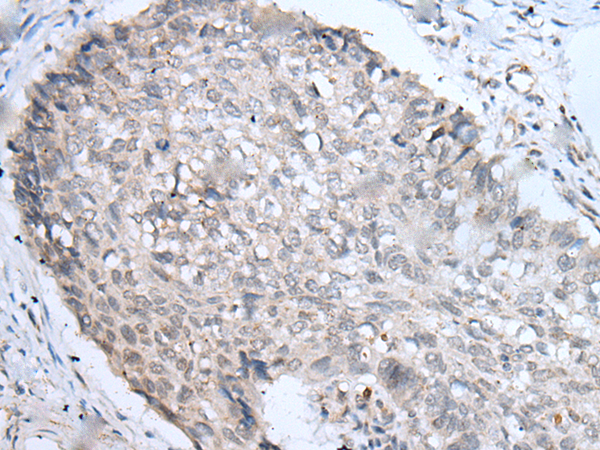
| WB | 咨询技术 | Human,Mouse,Rat |
| IF | 咨询技术 | Human,Mouse,Rat |
| IHC | 1/25-1/100 | Human,Mouse,Rat |
| ICC | 技术咨询 | Human,Mouse,Rat |
| FCM | 咨询技术 | Human,Mouse,Rat |
| Elisa | 1/5000-1/10000 | Human,Mouse,Rat |
| Aliases | MAC30 |
| Host/Isotype | Rabbit IgG |
| Antibody Type | Primary antibody |
| Storage | Store at 4°C short term. Aliquot and store at -20°C long term. Avoid freeze/thaw cycles. |
| Species Reactivity | Human, Mouse, Rat |
| Immunogen | Synthetic peptide of human TMEM97 |
| Formulation | Purified antibody in PBS with 0.05% sodium azide and 50% glycerol. |
+ +
以下是关于TMEM97抗体的3篇参考文献,包含文献名称、作者及摘要内容概括:
---
1. **文献名称**:*"Monoclonal Antibodies Targeting the Sigma-2 Receptor/TMEM97 Complex and Its Applications in Cancer Imaging"*
**作者**:Alon A. et al.
**摘要**:该研究开发了针对TMEM97(Sigma-2受体复合物成员)的单克隆抗体,验证了其在细胞膜和溶酶体中的定位能力,并展示了抗体在癌症细胞成像和靶向治疗中的潜在应用。
2. **文献名称**:*"TMEM97 Antibody Characterization and Its Role in Cholesterol Homeostasis"*
**作者**:Bartz F. et al.
**摘要**:通过免疫印迹和免疫荧光技术,验证了TMEM97抗体的特异性,揭示了TMEM97在调控细胞胆固醇代谢中的作用,为心血管疾病研究提供工具支持。
3. **文献名称**:*"Development of a Polyclonal Antibody Against TMEM97 for Neurodegenerative Disease Studies"*
**作者**:Xu J. et al.
**摘要**:研究团队开发了一种兔源多克隆抗体,成功用于检测阿尔茨海默病模型中的TMEM97表达变化,提示其与神经退行性病变的相关性。
---
以上文献均聚焦于TMEM97抗体的开发、验证及其在癌症、胆固醇代谢和神经疾病中的功能研究。如需具体文章链接或补充信息,可进一步提供检索关键词或数据库。
TMEM97 (Transmembrane Protein 97), also known as the sigma-2 receptor (σ2R), is a protein encoded by the TMEM97 gene. Initially identified as a binding site for neurosteroids and psychotropic drugs, it gained attention for its role in cholesterol homeostasis, cellular stress responses, and cancer biology. TMEM97 antibodies are critical tools for studying its expression, localization, and function in both physiological and pathological contexts. These antibodies are typically developed against specific epitopes, such as the N-terminal or C-terminal regions, and validated for applications like Western blotting, immunohistochemistry (IHC), immunofluorescence (IF), and flow cytometry.
Research using TMEM97 antibodies has revealed its overexpression in certain cancers, including breast, ovarian, and prostate malignancies, where it correlates with tumor progression and poor prognosis. Its involvement in cholesterol trafficking and interaction with the LDL receptor pathway has also linked it to neurodegenerative diseases like Alzheimer’s. Recent structural studies using cryo-EM have resolved TMEM97’s binding pockets for small molecules, further driving interest in its therapeutic targeting. Antibodies against TMEM97 help validate these findings, enabling the exploration of its role as a biomarker or therapeutic target. However, specificity validation remains crucial due to homology with other transmembrane proteins and potential cross-reactivity. Ongoing studies aim to refine antibody performance and expand applications in drug discovery and mechanistic research.
×